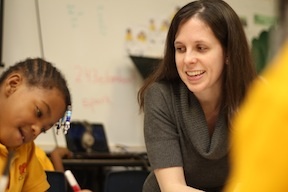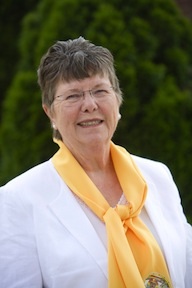Web Extras for "Making the Grade"
The Quarterly asked the alumnae educators quoted in “Making the Grade: What’s Right with US Public Education” to suggest Web sites, books, films, and other resources of particular use to teachers and others who care about public education. Here’s what they recommend…

Second-grade teacher Emilie Ronallo ’02 oversees a guided reading session at SPARK Acadmey in Newark, New Jersey. Credit: Thomas de Simon
Suggestions from Emilie Ronallo ’05
Knowledge is Power Program (KIPP)
Free, open-enrollment, college prep public schools in typically underserved areas. The majority of students come from low-income families. More than 95% of KIPP middle school students graduate from high school, and more than 85% of KIPP alumni have gone on to college. 95% of the students are African American or Latino.
The mission of this “movement to transform public education” is to defend the interests of children in public education and pursue reform so America will have the best education system in the world. The site offers blogs and videos.
Teach for America recruits recent college grads to teach for two years in urban and rural schools, training the recruits so they will have an immediate positive impact on their students.
Note: In August 2011, Teach For America released its fourth annual ranking of the schools contributing the greatest number of participants to its teaching corps, and Mount Holyoke is among the top 20 small colleges and universities.
Their mission is to create a network of schools in Newark, NJ, that instill in students the desire and ability to succeed in college, in order to change the world. They consistently send 90% of their students on to college. Students range in age from elementary school to high school, with 1,450 students currently enrolled and 5,000 students on the wait list.
Film
Waiting for Superman: The goal is to give every child in America a great education. They aim to recruit and reward great teachers, create nurturing schools, and increase literacy rates.
Books
The Shame of the Nation: The Restoration of Apartheid Schooling in America by Jonathan Kozol. View a video of Kozol speaking on this topic here.
Whatever It Takes: Geoffrey Canada’s Quest to Change Harlem and America by Paul Tough
For New Teachers:
Teachers post requests for donations based on what they most need in their classrooms, whether it be dictionaries, art supplies, or even funds for field trips. Donors select the project to which they would like to give, and in return, they receive photographs, thank you cards from the students, and an impact letter from the teacher.
A project of the Southern Poverty Law Center, the magazine that discusses everything from the need to have the arts in schools to how to make physical education classes more inclusive. Other publications geared specifically for children to learn about discourse in the classroom and the importance of equality.
“The Solution to Reading Comprehension.” Offers lessons and book lists for teachers and advice on how to teach to particular age groups.
Online “leveled” reading program with books to print and assemble. Lessons in phonics, vocabulary, poetry, etc.
Books
How to Talk so Kids Can Learn by Adele Faber & Elaine Mazlish
Teach Like a Champion: 49 Techniques that put Students on the Path to College by Doug Lemov
________________________________________________________________________________________________
Suggestions from Laura Rogers ’72
The founders felt a need for the perceptions of young people to be taken seriously, for their opinions to be counted, as opposed to their being seen as perpetual test-takers. Their dual message stresses what young people can accomplish when given the proper resources and what they can contribute when their ideas are taken seriously.
Next Generation Press is a publishing imprint of the organization, focused on bringing attention to the work of the nation’s youth.
Coalition of Essential Schools
The vision is to equip all students with the intellectual, social, and emotional skills necessary to become powerful and informed citizens within their communities. The organization envisions that these schools will serve as the catalyst for change among all schools.
TLN is a network of active communities populated by highly accomplished teachers from across the nation. They collaborate on research to improve student learning and refine policy insights that affect the students and communities they serve. The site offers blogs written by current teachers, expressing their opinions on classroom teaching, national policies, school administrations, etc. TLN is an initiative of The Center for Teaching Quality.
Book
I coauthored a book for new teachers, Fires in the Middle School Bathroom. Coauthor Kathleen Cushman also wrote Fires in the Bathroom for high school teachers.
The principles that guide the F.W. Parker Charter Essential School in Devens, MA, (where Laura Rogers ’72 was a founding trustee) are detailed here, in the 10 Common Principles of the Coalition of Essential Schools
_____________________________________________________________________________________________________
Suggestions from Nancy Ahlberg Mellor ’59
My interest is in advocacy for underrepresented populations in access to higher education. I recommend any of the works by Patricia Gandara of the University of California–Davis. Of particular interest is Over the Ivy Walls, published in 1995 and important even today.
Details about Nancy Mellor’s program for young Latino students can be seen in this 2002 Los Angeles Times feature story; in this miniprofile from a 1992 Alumnae Quarterly; <link here> and in this description of CHA House, in which students spend the summer at UC–Berkeley, attending courses which would not otherwise be available to them during their school years.
In 2009, Mount Holyoke Alumnae Association presented Nancy Mellor with the Elizabeth Topham Kennan Award. It recognized her “inspirational teaching, and for leading hundreds of students into a broader world of learning.”
________________________________________________________________________________________________

English teacher Meredith Louria ’77 speaks at a Santa Monica High School event. She says sterotypes such as those found in the film Bad Teacher ignore “the quiet, effective work that most of us do every day for thirty or forty years.”
Suggestion from Meredith Louria ’77
Facing History and Ourselves is the best professional development I’ve been involved with in my 30 years of teaching.
The site, which says it is “helping classrooms and communities worldwide link the past to moral choices today,” features educator resources, professional development, student videos, and news sections. Available for educators are podcasts, teaching strategies and video clips to help with classroom instruction.
________________________________________________________________________________________________
Suggestions from Karen Bang-Jensen Zumwalt ’65
I agree with Meredith. Facing History has an amazing professional development program. They have been running workshops at Columbia University’s Teachers College for many years to rave reviews.
Columbia University’s Teaching Residents @ Teachers College program
The Web site says that graduate students apprentice with experienced teachers in high-need areas of New York City for 14 months. They are given a stipend and assistance with health insurance. Following the program, they are required to teach for an additional three years in high-need areas of NYC. Learn more about the philosophy that guides residency programs offered by Columbia University’s Teachers College (and others).
_________________________________________________________________________________________________
Information about the work of Tara Paone ’81
(Paone is their chief financial officer.) The organization is dedicated to improving NYC public schools by attracting private investment. So far, Paone says, they’ve raised $300 million.
A New York Times story on the School of One.
The School of One was one of Time magazine’s “50 Best Inventions of 2009. (the School of One is supported by the Fund for Public Schools. ) Students are each given an individual “daily playlist” tailored to their needs and progress with a mix of traditional and nontraditional teaching methods and technologies.
________________________________________________________________________________________________
RELATED ARTICLE ABOUT MHC ALUMNAE TEACHERS: “Tales Out of School”
In this 2003 Quarterly feature article, alumnae teachers offer their solutions to widespread school issues.
>>>Note: Some annotations in the items above were provided by the Quarterly’s student editorial assistant, Laurel Rhame ’12.
October 19, 2011







